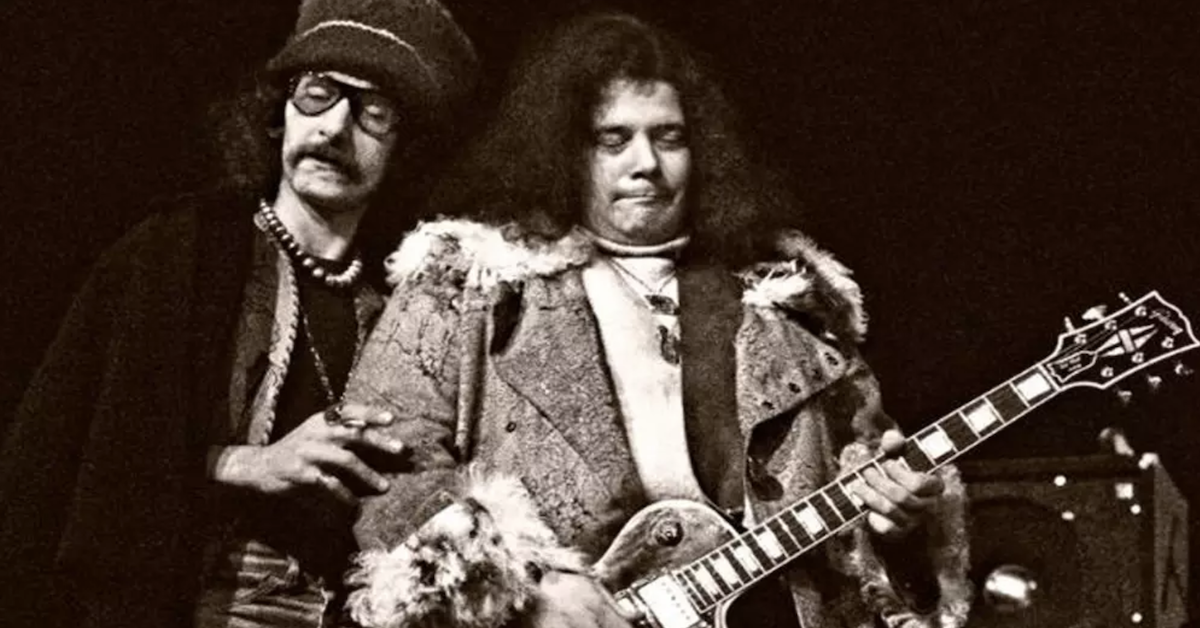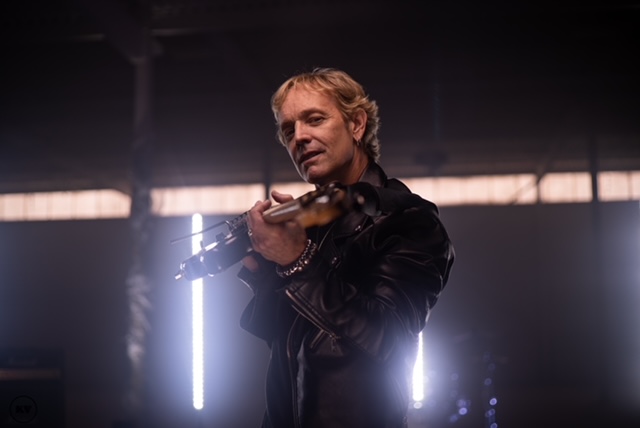Mountain (L to R): Felix Pappalardi, Leslie West, Corky Laing
By Jeff Tamarkin
Leslie West, best known as the guitarist and co-lead vocalist of hard-rock progenitors Mountain, died today (Dec. 23, 2020) due to cardiac arrest. West, who was in Palm Coast, Fla., at the time of his passing, was 75.
On Monday night, Dec. 21, West’s brother, Larry West Weinstein, posted on his Facebook page, “I am asking for all your prayers. Jenni is by his side in Florida but it’s not looking good. Thanks, Jenni, he wouldn’t have made it this far without you.” (Jenni refers to West’s wife Jenni Maurer. The couple wed onstage in August 2009 after Mountain’s performance at the Woodstock 40th anniversary concert in Bethel, N.Y.) Weinstein deleted the post the following day.
From the start of his career in the late ’60s, everything about Leslie West was larger than life. A plus-sized fellow, he had a guitar sound that matched—loud, fiery, fast and overpowering—and a voice that didn’t know the meaning of soft. When the history of heavy rock is traced today, it invariably points to him as one of the origin points—it was no accident that he called his band Mountain.
Related: Read the first half of the Best Classics Bands interview with Leslie West here, and part two here.
Born Leslie Weinstein in New York City on October 22, 1945, West grew up in New Jersey, Long Island and Queens and first gained local recognition in the New York City metro area with the R&B-influenced Vagrants, who cut a version of Otis Redding’s “Respect” that failed to chart nationally but later found new life due to its appearance on the influential garage-rock compilation album Nuggets: Original Artyfacts from the First Psychedelic Era, 1965–1968.
This music journalist asked West how the recording came about. “We went up to Atco, Atlantic Records, in [New York City], with my manager at the time,” he said. “We rented the studio and while we were fooling around, Tom Dowd, the famous producer, walked in and heard us. He said to my manager, ‘What label are you guys on?’ My manager said, ‘We’re not on a label,’ and he said, ‘What’s the matter with Atco?’ We turned around and said, ‘Nothing.’ So, he signed us.
“Then when I recorded ‘Respect,’ one day I go up to Atlantic. I get out of the elevator—I was going to pick up copies of the single. Right in front of me is Otis Redding. I started shitting a brick. There he is in a sharkskin suit and I said, ‘Mr. Redding, this is my group’s single, ‘Respect.’ He looked at it and he signed it, ‘To Leslie with respect.’”
In the early summer of 1969, West released his debut solo album, simply titled Mountain, recorded with Vagrants (and Cream) producer Felix Pappalardi on bass, drummer N.D. Smart and an organist on three tracks.

West, Pappalardi and Smart subsequently formed the band Mountain—with Steve Knight on keyboards—and immediately managed to land a gig at the Woodstock festival before most of the audience knew who they were.
“It was only our third or fourth show,” West told this journalist. “I don’t know if they got what we were doing because to tell you the truth I was so nervous. You could see maybe 40 rows in front of you. We got to go on at a great time because Jimi Hendrix’s agent was our agent. Jimi was like the unofficial headliner of Woodstock. So, he must have said, ‘If you want Hendrix, you have to take this other group, Mountain.’ They paid us $5,000 and we did get paid.”
Following the high-profile gig, Smart was replaced by drummer Corky Laing and the band released a series of albums that served as prototypes for the emerging heavy metal sound. Their 1970 debut album as an official group, Climbing!, established them as a rising-star act and vaulted to #17 on the Billboard chart. The album included such classic rock staples-to-be as the scorching “Never in My Life,” the midtempo “Theme for an Imaginary Western” (co-written by Cream’s Jack Bruce and lyricist Pete Brown), and “For Yasgur’s Farm,” a tribute to Woodstock.
Listen to Mountain perform their song “Long Red” at Woodstock
But it was the album’s opening track, “Mississippi Queen,” the blasting, cowbell-powered anthem, that emerged as the highlight of the album and became Mountain’s signature number. It reached #21 in the spring of 1970 and remained the group’s biggest hit single.
West was asked how the song came about. “Corky Laing had this lyric and he came to my apartment in Manhattan. He says, ‘Look, I have this lyric, ‘Mississippi Queen.’ He said when he was in Nantucket and playing this bar and the power went out, he was just playing the drums and shouting the words ‘Mississippi Queen, do you know what I mean?’ He’s watching this girl dance—this is what he says. So, I started fooling around with the guitar in the apartment and I came up with this riff and it’s three chords. We went really quickly into the studio and Felix told him to count it off and he counted it off with a cowbell. We left it in there.”
Mountain’s sophomore album, 1971’s Nantucket Sleighride, bested the debut by one point, hitting #16, but produced no hit singles. It was followed by Flowers of Evil (also 1971), and the 1972 release Mountain Live: The Road Goes Ever On, culled from tracks recorded between 1969 and ’72. By the time of its release, the band had already split.

In 1981 West and Laing would reboot Mountain again, with Miller Anderson on bass, but it was short-lived. (Meanwhile, Pappalardi’s life came to a tragic end in 1983 when he was shot to death by his wife, Gail.)
Although there would be other attempts to re-form Mountain, West primarily maintained a solo career into the current century. He released numerous albums, and—always wielding his axe of choice, a Les Paul Jr.—performed live in a number of configurations, steadily gaining recognition as a pioneer of heavy rock.
In 2011, however, West had his lower right leg amputated as the result of worsening diabetes. Undeterred, he continued to perform until late in his life, playing guitar from a seated position onstage.
Listen to Mountain’s “Theme for an Imaginary Western”
Bonus Video: Watch Leslie West and Peter Frampton duel it out on “Mississippi Queen” in 2013
Another Bonus Video: Listen to West perform on lead guitar with The Who in the Record Plant recording studio in New York in 1971














